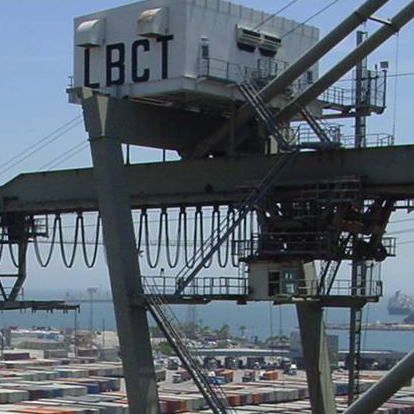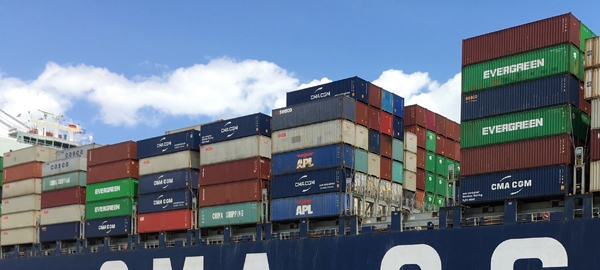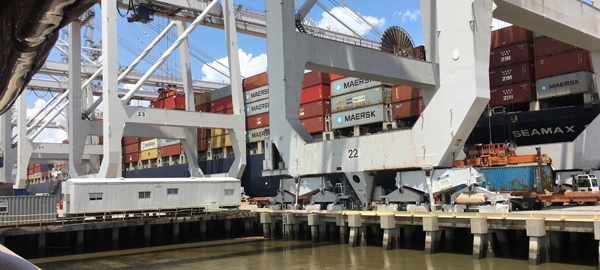
FTZ’ine April 2023
April 4, 2023
FTZ’ine June 2023
May 31, 2023Mixed Signals For FTZs
The month of April was a mixture of good and not-as-good news for international traders.
The ILWU announced that they reached agreement on more key issues with the PMA, which is an improvement over the work stoppages we reported to you in April’s FTZ’ine. No west coast contract yet though.
U.S. Customs had dramatic attendance at their Trade Summit in Boston this past month, but few answers to critical questions for the foreign-trade zone operators in attendance.
The U.S. and China continue to exchange menacing looks across the South China Sea, but toned down the ‘decoupling’ rhetoric in the trade space. A little bit.
The ADP jobs report that came out yesterday signaled a significant cooling in the U.S. job market. That at once means that Fed moves to slow the economy seem to be working, but it remains hard to tell if a recession can be avoided. After seizing Silicon Valley Bank in March, the FDIC seized First Republic Bank just this past weekend. Even if more banks do not collapse, commercial and real estate markets will not be able to avoid the impact of rising interest rates, and the looming debt ceiling battle in Washington adds to the uncertainty this month.

Top Story: CBP Summit Fields Tough FTZ Questions
U.S. Customs and Border Protection held its 2023 Trade Facilitation and Cargo Security Summit in Boston last month. It was not a surprise that folks across the country attended via webinar.
What was a surprise was the number of in-person attendees that came to engage with CBP, participating government agencies, and each other at the event. After a pandemic-induced hiatus, CBP combined their Trade Symposium with a review of updates to CTPAT, and the agenda drew shoulder-to-shoulder audience.
Foreign-trade zone users who attended did not get the movement they were hoping for on Section 321 though. Several questions from the audience asked CBP to rationalize the ability to make de minimus entries from Canada and Mexico but not from the U.S.
CBP offered no answers to the de minimus problem and its impact on U.S. commerce and trade security. Officials recognized from the podium that shipments from U.S. FTZs could legitimately u-turn at the border to qualify for duty-free treatment under Section 321.
Summit sessions that were popular included how to prepare for your CTPAT revalidation, and smuggling trends around the country. There were also demonstrations of CBP lab techniques and available one-on-one consultations with each of the CEEs to review classification and other entry issues.
CBP also spoke at length about its efforts to thwart forced labor content in U.S. imports.
They reported that since June, officers have seized $961 million worth of goods over suspected ties to forced labor. Topping the list of detained items in terms of value are electronics, apparel, footwear, textiles and agricultural products.
In just one example, approximately $20 million worth of solar panels are being detained at a warehouse in the Port of New York and New Jersey.
CBP has been working with importers with the ability to amend their supply chains. While most supply chains with China components have a difficult time producing the records needed to disprove forced labor content, CBP last month lifted the Withhold Release Order (WRO) on certain disposable glove imports from Malaysia.
Tech Tip: FTZ Weekly Estimates – Oh the Possibilities
On a recent NAFTZ webinar, ISCM’s own Sr. Vice President, Melissa Irmen, co-presented on the topic of CBP looking for every HTS/COO/MID/Status combination that might be removed from the zone on the weekly estimate filing. This can create some challenges when the number of lines allowed on that filing is 998.
During the webinar, some best practices shared included:
- If you have been including only one MID per COO for each HTS in your zone, review the documentation of the practice.
- Consider any supplemental estimates you are filing today. There are many scenarios requiring supplemental entries, but if the regularly reported volumes are too low, you can adjust them. Be sure to allow enough room for seasonal fluctuations and increased market demand for your products.
- Review your weekly estimate regularly. FTZ software often provides tools for copying one estimate to the next, making it is easy to forget that you should periodically review them. Are you still buying from all those suppliers? Do you still admit product from that country? Is there inventory in the FTZ that matches the estimate, or has it all been depleted and not replaced?
As an FTZ administrator, you may or may not have direct visibility into sourcing decision making that impacts the FTZ weekly estimate. ISCM can help with specialized training for purchasing and logistics personnel to educate on the importance of communicating changes in these areas.
If you have questions or comments about your weekly estimate or weekly entries, please send them to us at Info@iscm.co.


Katherine Tai says US not seeking to 'decouple' from China
U.S. Trade Representative Katherine Tai spoke at the Foreign Correspondents' Club of Japan last month in Tokyo and said the United States is not seeking to decouple the American economy from China’s.
U.S. trade sanctions against China are “narrowly targeted,” she said, and given its position as the planet’s #2 economy, unraveling ties with China is “not a goal or achievable.”
USTR Tai was in Japan to discuss the security and stability of supply chains that both countries rely on. Despite the softening stance on China expressed by Ambassador Tai on behalf of the Biden Administration, not everyone in Washington is ready or willing to dial back the rhetoric on China as an economic or military threat.
The new House Select Committee On China spent more than two hours gaming out possible war scenarios during a first month of imagined fighting over Taiwan. U.S. Representative Mike Gallagher, the Wisconsin Republican who leads the Committee, said the simulation predicted “disastrous economic consequences” for the global economy if China launches an attempt to seize the island.
The most important conclusion from the simulation for traders was that ship traffic in the region stops, and Asia-dependent supply chains would grind to a halt.
Such continued exercises, combined with actual U.S. and allied military activity in the South China Sea make substantial improvement in relations seem far off.
Ambassador Tai also reviewed the status of negotiations on the Indo-Pacific Economic Framework, or IPEF, a new trade compact proposed by Washington.
The framework has 13 members, including the U.S., that account for 40% of global gross domestic product: Australia, Brunei, India, Indonesia, Japan, South Korea, Malaysia, New Zealand, the Philippines, Singapore, Thailand and Vietnam.
On the one hand U.S. diplomats including Secretary of State Antony Blinken have increased quiet diplomacy in the region including visits to Vietnam, a traditional rival to its much larger neighbor China.
On the other hand Treasury Secretary Janet Yellen said the Biden administration was prepared to accept economic costs to protect US national security interests.
“National security is of paramount importance in our relationship with China,” Yellen said in a speech at Johns Hopkins University. “We will not compromise on these concerns, even when they force trade-offs with our economic interests.”
The Treasury chief set a defiant tone in some of her remarks, contesting predictions that China would eclipse the US as the world’s largest economic power and lead to a “clash between nations.”
“Pronouncements of US decline have been around for decades, but they have always been proven wrong,” she said in the address at Johns Hopkins University’s School of Advanced International Studies. “The United States has repeatedly demonstrated its ability to adapt and reinvent to face new challenges. This time will be no different.”
Canada Jumps In The Game On EV Batteries
The government of Canada agreed to subsidies of nearly $10B over a decade to land a Volkswagen AG electric-vehicle battery plant, the company’s first outside Europe.
Canada will provide annual production subsidies as well as a grant toward the factory’s capital cost — effectively matching what the German automaker could have received via the Inflation Reduction Act if it had located the plant in the US.
The actual size of the incentive depends on how much the plant produces and what happens with US policy. The contract is written so that Canada’s production subsidies will stay in place only as long as the Inflation Reduction Act is in force. If the US reduces its incentives for clean manufacturing, Canada’s will go down proportionally.
The deal offers a stark example of how the US’s trading partners are trying to keep pace with the financial incentives contained in climate legislation signed by President Joe Biden last year. The factory is expected to become the largest manufacturing site in Canada.
Canadian government officials believe the financial aid for Volkswagen is necessary to protect Canada’s position in the North American auto sector as it moves away from internal-combustion engines, and to ensure the country isn’t seen as merely a provider of critical minerals but also a source of advanced manufacturing and clean technology.
The plant will cost about $5B to build, span 350 acres and will create thousands of jobs in the region around St. Thomas, a southern Ontario city about two hours northeast of Detroit.
Last year, LG and Stellantis announced a $4 billion joint venture in nearby Windsor, Ontario, across the border from Detroit. The Canadian government is also in talks on financial help for that plant.


China Economy Turns Upward
Regardless of its relationship with the U.S., China’s wealth still has a major impact on the global economy. So the trade took notice when the world’s second-largest economy beat growth expectations.
China’s economy grew 4.5% in its first full quarter since Beijing lifted its “Zero-Covid” restrictions. Growth was boosted by increased consumption and retail sales.
The 4.5% growth in gross domestic product from January to March compared to the same period in 2022 was the fastest in the past year, and outpaced the 2.9% growth in the previous quarter, according to Chinese government data released last month.
Authorities cautioned that China will likely face import and export pressures in the coming months amid an uncertain international economic environment, and also warned of inadequate domestic market demand in the world’s No. 2 economy.
The higher-than-expected rise in GDP for the quarter comes amid a rebound in consumption, as people flocked to shopping malls and restaurants after “zero-COVID” restrictions were removed at the end of 2022. Analysts initially pegged economic growth to be about 4%.
Earlier this year, China’s government set this year’s economic growth target at “around 5%,” a conservative target that will only be met if GDP grows faster in the months ahead.
In the first quarter, China’s exports grew an astounding 8.4%, although this could be the result of suppliers catching up in fulfilling orders disrupted during COVID-19.
Foreign-Trade Zones Await West Coast Word
The International Longshore and Warehouse Union announced last month that it had reached an agreement on certain key issues with the Pacific Maritime Association.
Negotiations in San Francisco are ongoing and a complete contract agreement has not yet been formalized.
The previous west coast labor agreement, covering more than 22,000 longshore workers at 29 ports expired on July 1st of last year. Priorities for the new contract are thought to be wages and the role of automation, but both parties have agreed not to disclose any terms.
The union and the PMA previously announced in late July 2022 that they had reached a tentative agreement on terms for the maintenance of health benefits.
The negotiations are not without tension as PMA accused ILWU Local 13 of withholding labor that shut down terminals at the Ports of Los Angeles and Long Beach for two days.
In the first three months of 2023, the ports of Los Angeles and Long Beach handled 3.5 million TEUs (1.8 million containers for Los Angeles and 1.7 million containers for Long Beach), down 30% compared to the same period in 2022.


FTZ Staff Activity
- FTZ Board Staff processed a Traditional Minor Boundary Modification (S-63-2023) in FTZ 168G on behalf of Sager Electronics in Carrollton, TX on April 3, 2023
- FTZ Board Staff processed a Minor Boundary Modification (S-64-2023) in FTZ 84 on behalf of Weida Freight System, Inc. in Houston, TX on April 3, 2023
- FTZ Board Staff processed a Minor Boundary Modification (S-65-2023) in FTZ 134C on behalf of LZB Manufacturing, Inc.in Dayton, TN on April 5, 2023
- FTZ Board Staff processed a Minor Boundary Modification (S-66-2023) in FTZ 72W on behalf of Dorel Juvenile Group, Inc. in Columbus, IN on April 6, 2023
- FTZ Board Staff processed a Minor Boundary Modification (S-67-2023) in FTZ 32D on behalf of Weida Freight System, Inc. in Doral, FL on April 6, 2023
- FTZ Board Staff processed a Minor Boundary Modification (S-68-2023) in FTZ 32 on behalf of CIF Group International, Inc. in Doral, FL on April 6, 2023
- FTZ Board Staff processed a Minor Boundary Modification (S-69-2023) in FTZ 32 on behalf of Dux Logistics America Corp. in Doral, FL on April 6, 2023
- FTZ Board Staff processed a Termination (S-70-2023) in FTZ 70 on behalf of Multiple Companies in Detroit, MI on April 6, 2023
- FTZ Board Staff processed a Minor Boundary Modification (S-71-2023) in FTZ 129 on behalf of Vicinity Motor (Bus) USA Corp./ Vicinity Motor (Trucks) USA Corp. in Ferndale, WA on April 10, 2023
- FTZ Board Staff processed a Minor Boundary Modification (S-72-2023) in FTZ 50 on behalf of Weida Freight System, Inc. in City of Industry, CA on April 10, 2023
- FTZ Board Staff processed a Minor Boundary Modification (S-73-2023) in FTZ 202 on behalf of Bee Imagine, LLC in Irwindale, CA on April 12, 2023
- FTZ Board Staff processed a Minor Boundary Modification (S-74-2023) in FTZ 45I on behalf of Allied Technologies Internationalin Wilsonville, OR on April 12, 2023
- FTZ Board Staff processed a Minor Boundary Modification (S-75-2023) in FTZ 214D on behalf of Fortessa Tableware Solutions, LLC in Kinston, NC on April 18, 2023
- FTZ Board Staff processed a Termination (S-76-2023) in FTZ 50 on behalf of Multiple Companies in Long Beach, CA on April 18, 2023
Foreign-Trade Zone Board Activity
- AbbVie Ltd. submitted a notification of proposed production activity for additional components of pharmaceutical products within Foreign-Trade Zone 7 in Barceloneta, Puerto Rico. MORE
- The Board of County Commissioners of Washington County submitted an application for reorganization and expansion of Foreign-Trade Zone 255 under the alternative site framework in Washington County, Maryland. MORE
- Jayco, Inc. submitted a notification of proposed production activity for motorhomes within Foreign-Trade Zone 125 in Middlebury, Indiana. MORE
- Jacksonville Port Authority submitted an application for reorganization(expansion of the service area) of Foreign-Trade Zone 64 under the alternative site framework in Jacksonville, Florida. MORE
- Par Hawaii Refining, LLC received authorization of limited production activity for renewable fuels within Foreign-Trade Zone 9 in Kapolei, Hawaii. MORE
- GSM Engineered Fabrics, LLC submitted a notification of proposed production activity for industrial belts within Foreign-Trade Zone 204 in Kingsport, Tennessee. MORE
- Boehringer Ingelheim Animal Health Puerto Rico LLC received authorization of production activity for pharmaceutical products/canine within Foreign-Trade Zone 61 in Barceloneta, Puerto Rico. MORE
- TSMC Arizona Corporation received authorization of production activity for semiconductor wafers within Foreign-Trade Zone 75 in Phoenix, Arizona. MORE
- Global Manufacturing LLC received authorization of limited production activity for mattresses and box springs within Foreign-Trade Zone 163 in Ponce, Puerto Rico. MORE
- CNH Industrial America LLC received authorization of production activity for tractor component parts and axle subassemblies within Foreign-Trade Zone 41 in Sturtevant, Wisconsin. MORE
- United Safety Technology Corp received authorization of production activity for medical and non-medical disposable gloves within Foreign-Trade Zone 74 in Sparrows Point, Maryland. MORE
- FMC Agricultural Caribe Industries, Ltd. submitted a notification of proposed production activity for agricultural chemicals within Foreign-Trade Zone 7 in Manati, Puerto Rico. MORE
- Jos. H Lowenstein & Sons, Inc. submitted a notification of proposed production activity for dyestuff chemicals for hair, fur and, leather within Foreign-Trade Zone 1 in Brooklyn, New York. MORE
- Procter & Gamble Manufacturing Company received authorization of production activity for industrial perfumes/fragrance mixtures within Foreign-Trade Zone 151 in Lima, Ohio. MORE
- Barco Stamping Co. Inc. received authorization of production activity for stamped metal products within Foreign-Trade Zone 219 in Yuma, Arizona. MORE
- BMW Manufacturing Company, LLC received authorization of production activity for additional components of passenger motor vehicles within Foreign-Trade Zone 38 in Spartanburg, South Carolina. MORE
- Airbus OneWeb Satellites, North America LLC submitted a notification of proposed production activity for satellites and satellite systems within Foreign-Trade Zone 136 in Merritt Island, Florida. MORE
- The Dallas/Fort Worth International Airport Board received authorization for the reorganization and expansion of Foreign-Trade Zone 39 in Dallas/Fort Worth, Texas. MORE

Mixed Signals For FTZs
The month of April was a mixture of good and not-as-good news for international traders.
The ILWU announced that they reached agreement on more key issues with the PMA, which is an improvement over the work stoppages we reported to you in April’s FTZ’ine. No west coast contract yet though.
U.S. Customs had dramatic attendance at their Trade Summit in Boston this past month, but few answers to critical questions for the foreign-trade zone operators in attendance.
The U.S. and China continue to exchange menacing looks across the South China Sea, but toned down the ‘decoupling’ rhetoric in the trade space. A little bit. The ADP jobs report that came out yesterday signaled a significant cooling in the U.S. job market. That at once means that Fed moves to slow the economy seem to be working, but it remains hard to tell if a recession can be avoided. After seizing Silicon Valley Bank in March, the FDIC seized First Republic Bank just this past weekend. Even if more banks do not collapse, commercial and real estate markets will not be able to avoid the impact of rising interest rates, and the looming debt ceiling battle in Washington adds to the uncertainty this month.

